The Voices of Environmental Degradation
"Voices in the Middle of Water Crisis" is here as a platform for anyone to talk about social, environmental, and psychological conditions when facing social and environmental degradation. Especially the presence of the water crisis, which is slowly starting to be realized. One by one, problems arose when clean water availability began to shrink.
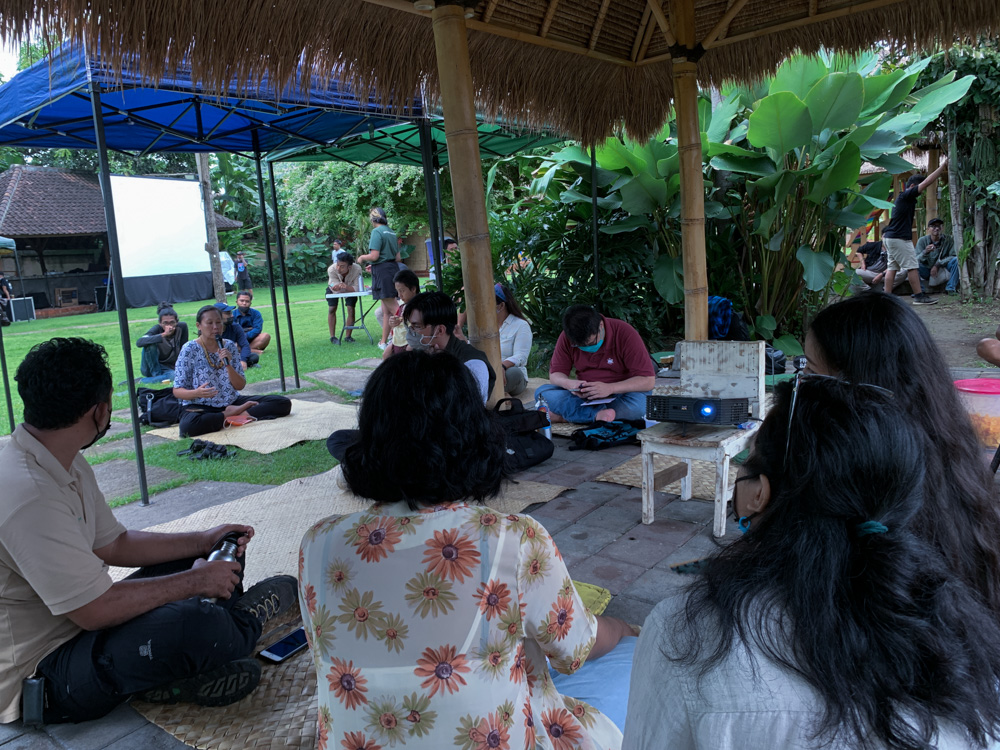
Discussion about Women and Disasters (Photo: Gusti Diah)
Water degradation is an implication of massive groundwater exploitation, and IDEP has seen this problem as a threat to the sustainability of nature in Bali. In 2012, Bali Water Protection (BWP) movement began to be designed. The campaign was initiated by involving various levels of the community. This effort is also reflected in the festival that BWP held on December 4, 2021.
Describing Environment Responsibility through Coloring
The festival "Voices in the Middle of Water Crisis" also became a place for children in Bali to speak out through coloring activities. In one page of pictures, they are invited to imagine through color and dialogue, developing what has been presented in the illustrations by Beluluk (Putu Dian). "Daily activities inspire so many illustrations. Not only telling stories, but children also insert impressions and messages into the pictures they color," said Dewa Wira from Bali Water Protection.
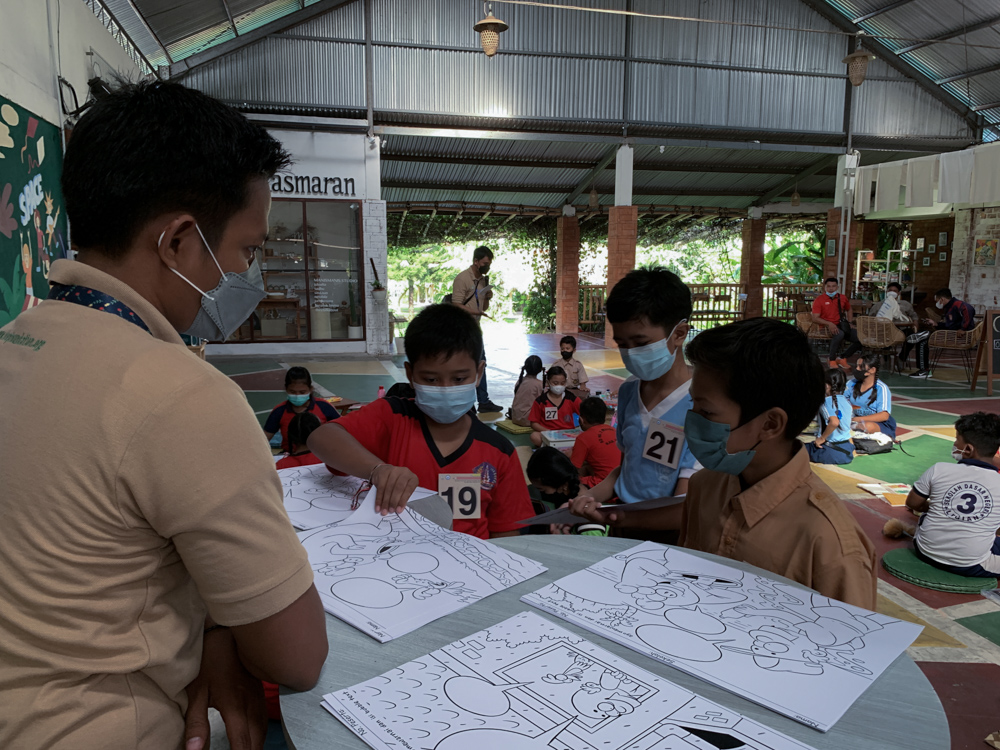
Participants choose pictures that they will color and describe (Photo: Gusti Diah)
This coloring activity becomes a favorite for children because they can understand the message without pressure. "I want to participate in these BWP events again because the events are good, and it's not boring," said Gusti Ayu Kusuma, a participant from elementary school. He also added new information obtained from online classes and coloring competitions, "In my opinion, without water, we cannot live. Therefore, we must conserve water such as turning off the faucet when not in use and using water sparingly."
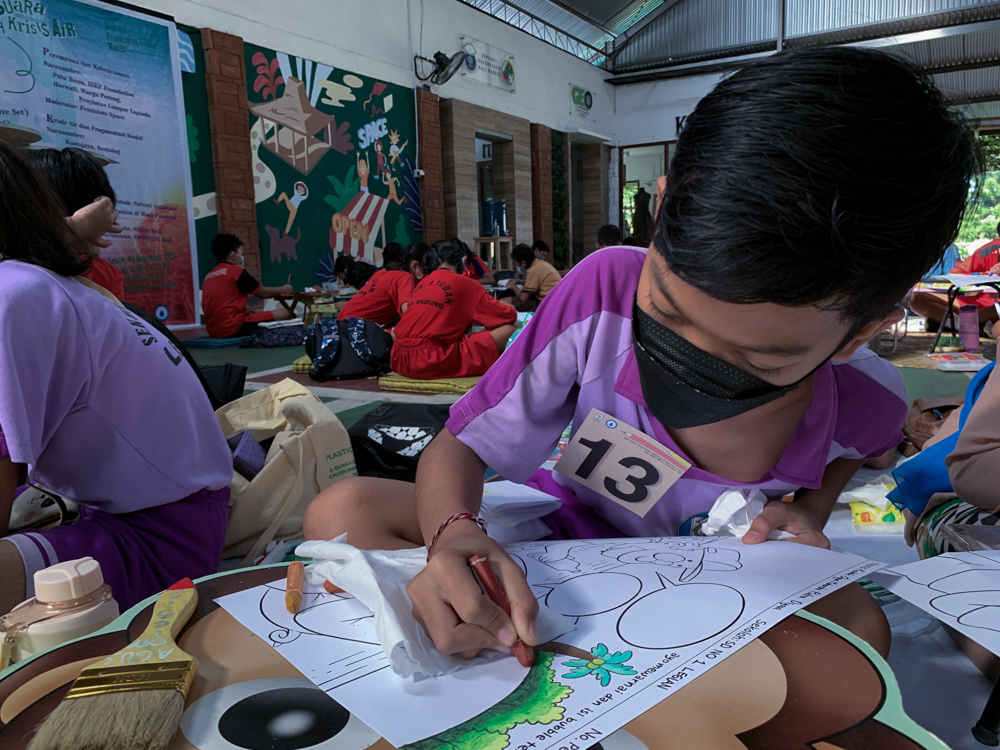
Participants begin to color the pictures they choose (Photo: Gusti Diah)
During the pandemic, the BWP program that involved children was carried out through online classes for various regions in Bali. Many online activities, starting with presentations on water conditions in Bali, quizzes, and writing essays together. Then each school will get learning media related to water conservation through comics and coloring books. "Schools are very happy when there are activities related to the environment and nature, especially involving children to do activities together," said Dewa, who is also the PIC for the Adopt A River project that concerns education to schools.
When Women Speak for Rights and the Environment
Like BWP's goal to involve various levels of society, the festival at Geo Open Space, Kerobokan, also involved women activists who worked for environmental justice. BWP discussed Women and Disasters involving Harwati, a woman affected by Lapindo Mud as a speaker, and Feminists Space guided this discussion.
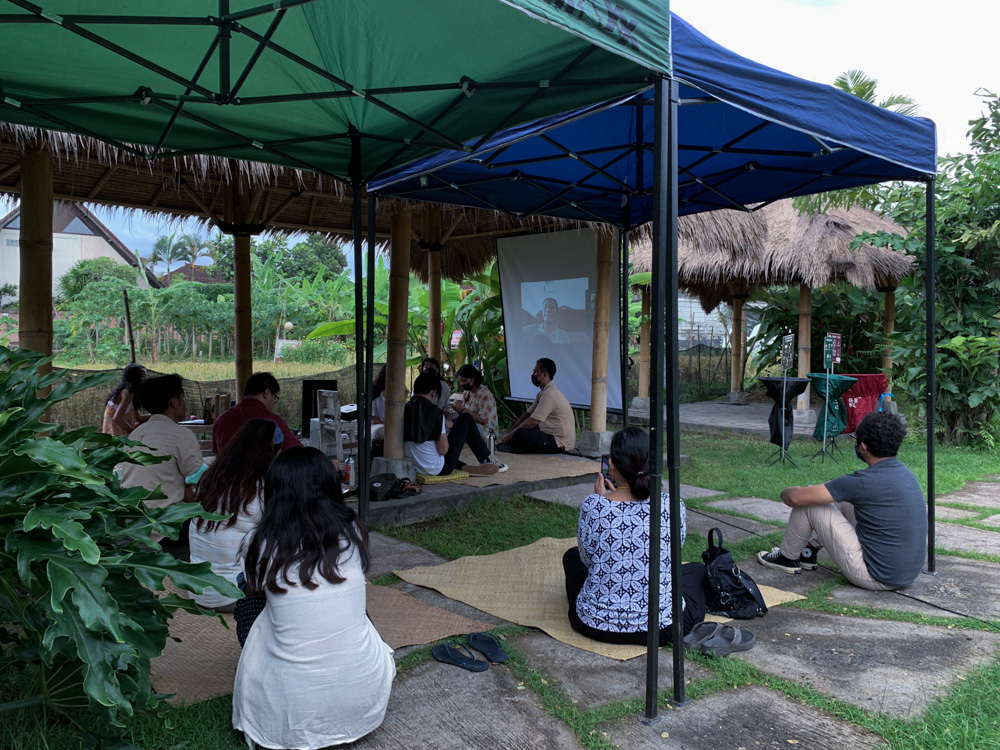
When Harwati talked about the conditions after the emergence of the Lapindo mud incident (Photo: Gusti Diah)
Almost 15 years after the Lapindo Mud incident, Harwati took various steps and strategies to fight for the rights of the affected people. He also told about the entry beginning of the Lapindo company. "When the Lapindo Mud, I was pregnant with my second child, I didn't know that mud was dangerous, and we all smell it every day," said Harwati.
Other communities also felt the same way as Harwati thought it was dangerous. Within months, Mud was covering almost all of the villages. Then, the community was relocated to shelter camps. The shelter situation turned out to be unfriendly for pregnant and lactating women, children, and the elderly. Everyone is brought together in the same place, so there is no special care. Camp situations and pollution caused by the Lapindo mud have a significant impact on the health of the affected community. Therefore, Harwati invites other villagers who are also restless to draft demands related to their environmental rights. "From the start, we brought this health problem, especially from what I observed, many women were getting ill of cervical and breast cancer," said this woman from Porong.
Health and environmental issues are still becoming a concern of Harwati and women in villages affected by the Lapindo Mud. They also built a Women and Children Care Community as a place for them to pour out their feelings and problems. Right now, this community already has a business entity, collective garden, and water treatment because water has been contaminated with Lapindo Mud.
Harwati's story has opened up our perspectives in this discussion, especially about women's voices, which are fundamental. The environmental crisis has also threatened various social, economic, cultural, and health aspects. Therefore, this disaster needs to be prevented before it gets worse.
Discovering Big Project that Destroyed Environment and Subak
The environmental crisis needs to be prevented, and that's what Walhi Bali did when they found potential problems when the government pushed the Gilimanuk-Mengwi Toll construction. "We see that this road [toll] has a bad impact on agricultural land where the land is used for water management," said Bokis from Walhi Bali.
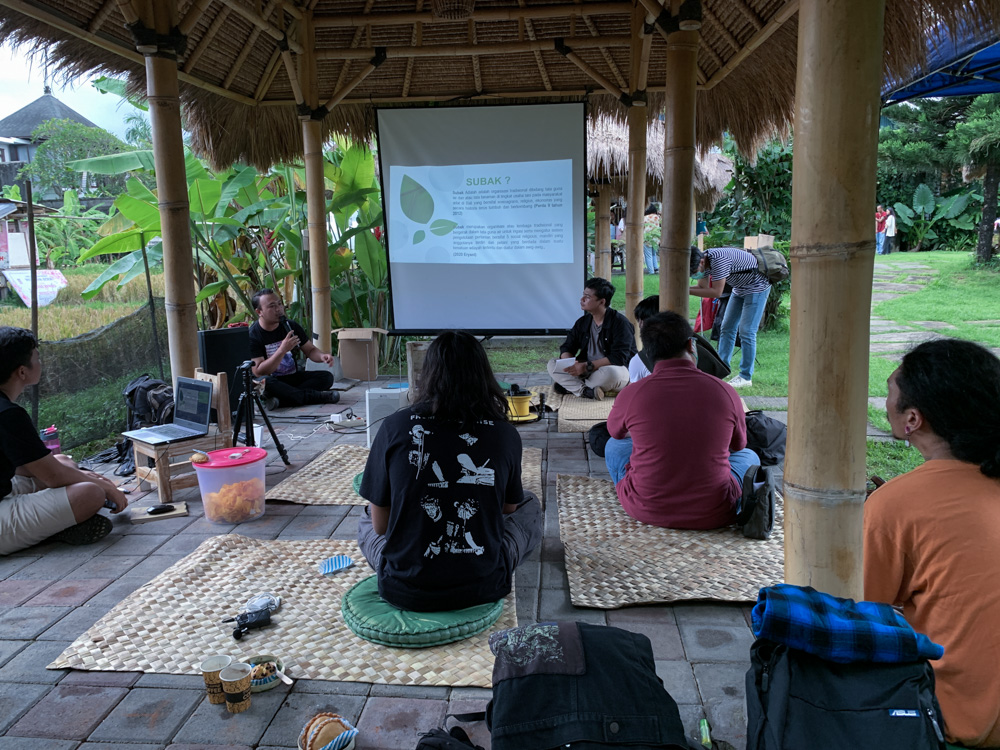
Bokis explained Walhi Bali's research on the environmental impact of the Gilimanuk-Mengwi toll construction (Photo: Gusti Diah)
Based on research conducted by Walhi Bali and other researchers, based on documents from the Ministry of Environment and Forestry (KLHK), Jembrana and Tabanan have a significant role in nature conservation. However, when the toll road construction is carried out, it will threaten the natural functions of both areas. Then this project will threaten Subak land, thus threatening food sovereignty in Bali. Besides, WALHI saw irregularities in this big project. First, about infrastructure development that held during the pandemic. Second, the absence of a straightforward narrative regarding the reasons for the construction of the toll road.
Besides the existing problems and irregularities, the construction of toll roads also has a campaign solution, namely economic improvement. Investors and the government widely use this narration. But it turned out to be a steep gap. "Toll road construction is usually associated with connectivity for economic improvement, and however it only connects big cities. Improving the economy of big cities, and threatening the local economy and existing localities," said Gustu, a participant who attended the discussion.
This discussion takes a more profound view of the impact of infrastructure development. As Walhi Bali reported, the toll road's construction will threaten its natural function as nature conservation and water absorption in the Jembrana and Tabanan areas. This function is actual and is currently being threatened by development that is not environmentally oriented. This condition is reflected in the documentary film Lokawana: The Forest and the Hustle of Man.
Lokawana: Reflections on Environmental Crisis in Bali
The film Lokawana takes place in Yehembang Kauh Village, Jembrana, one of the remaining forests in Bali, and is highly threatened. Specifically, the West Bali Forest has experienced several forest encroachments. This phenomenon is closely related to Ngawen, which local people know as encroaching on the forest to clear land, mostly for agriculture. However, a dilemma arises when this activity is carried out. On the one hand, they realize the importance of protecting the forest for nature's sustainability and life. But on the other hand, they need to fulfill their daily needs. "We can't allow deforestation, but we don't necessarily throw all the accusations at the community," said Wayan Martino, director of the Lokawana Documentary.
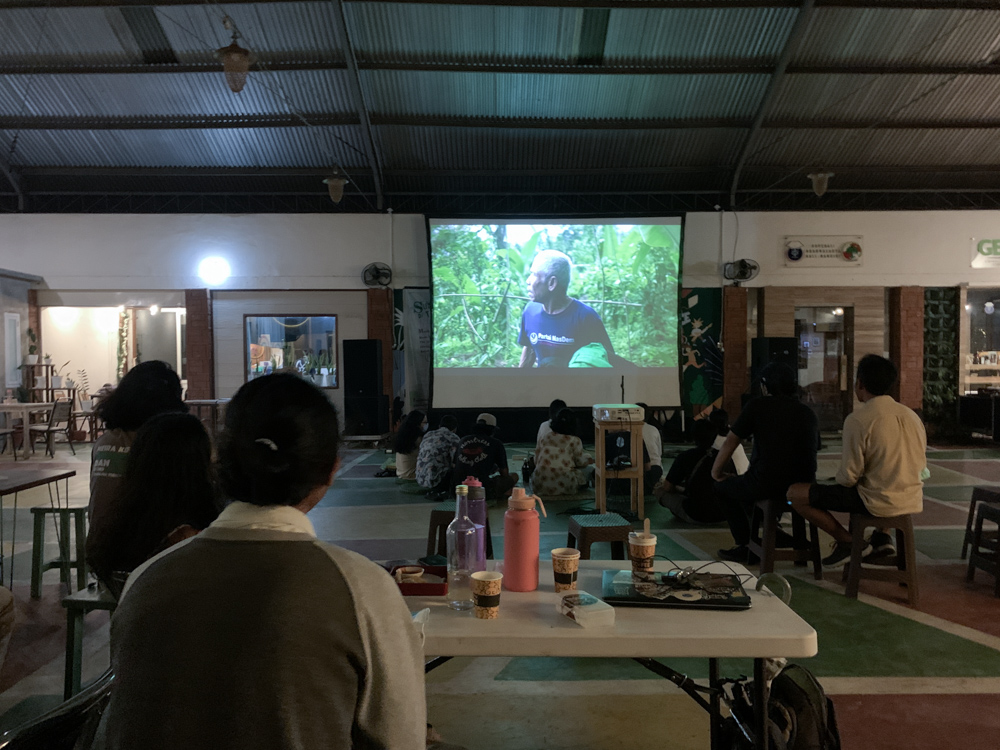
Screening Movie of Lokawana (Photo: Gusti Diah)
The hierarchical form of society has forced them to follow the rules created by the rulers and become guilty of it. When alternatives exist, the community can be independent without encroaching on the forest. They have sustainable living cultures, and that knowledge is what IDEP is trying to explore as a foundation that works through permaculture and disaster risk reduction. IDEP offered various programs such as building family gardens, post-harvest training to increase product value, disaster mitigation training and building good relations between local communities through Hutan Belajar. "I don't have the power to govern people, but I want to invite each other to protect our forests so that they are sustainable. Through Hutan Belajar, we can preserve the forest. In this space, we already have endemic plant seeds. We cultivate it in this forest," said Restu, a local Yehembang Kauh community.
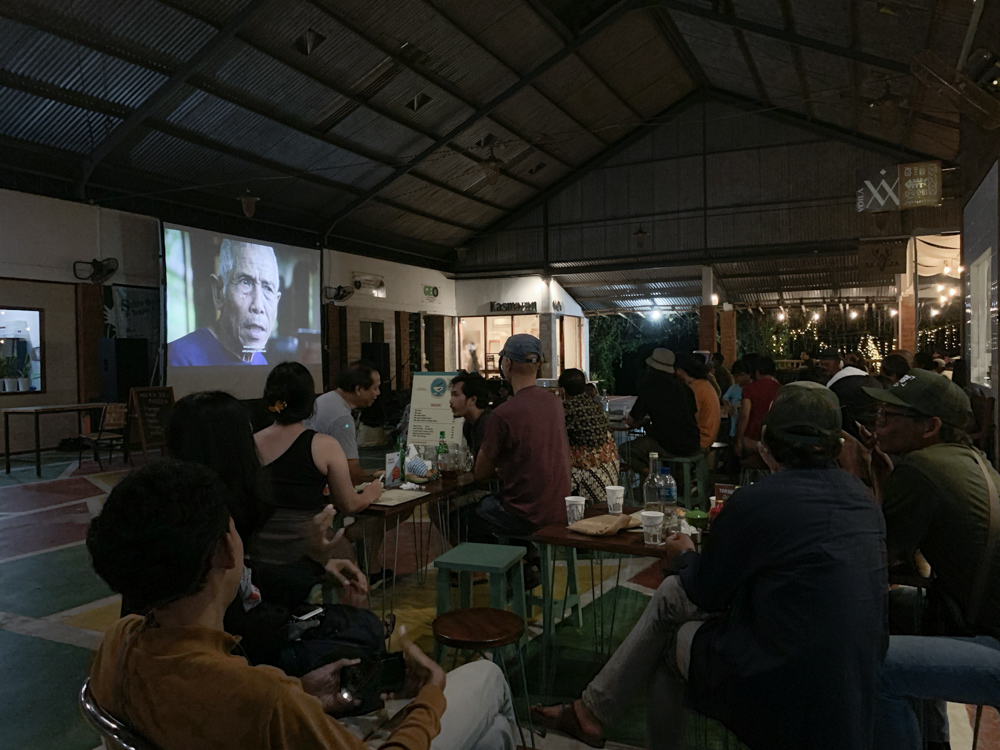
Participants attending the discussion and screening of the Lokawana Documentary (Photo: Gusti Diah)
Restu and several local community groups in the West Bali Forest are aware of the importance of forests, especially water conservation. Forests are also present as water absorption zones which will later support downstream activities. But every year, the function of the forest decreases along with the increase in forest encroachment. "The name of Yehembang means abundant water, but during the dry season, it is scorched, and during the rainy season, it is flooded," explained Dewie Anggraini from Bali Water Protection and producer of the Lokawana Documentary.
"The water crisis is not a new thing, and Bali has been discussing this issue for the past ten years. You can imagine Bali without water, from its agriculture and all. We can see disasters that can occur such as droughts, floods, and so on that cannot be separated," said Longgena Ginting, an environmental activist. Moreover, this head of Greenpeace Indonesia in 2012 hopes that there will be platforms that become a foothold for all community elements in efforts to overcome water and environmental crisis. "We need to realize together that the island of Bali is not doing well, there has been a severe water crisis, and we need our role together to overcome it," added Dewie. (Gd)
Subscribe to IDEP Newsletters
Give a gift that will change lives. 100% funds charity projects.
|






